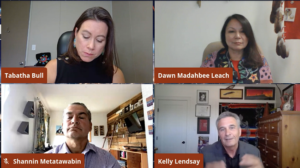Madahbee Leach featured in online panel on Indigenous economic strategies

By Sam Laskaris
AUNDECK OMNI KANING FIRST NATION – It seems only fitting that Dawn Madahbee Leach was asked to speak on a panel about teamwork.
Madahbee Leach, a member of Aundeck Omni Kaning First Nation, was one of the speakers on a panel titled National Indigenous Business Organizations Working Together at the Business Recovery Forum, held online and organized by the Canadian Council for Aboriginal Business (CCAB).
The panel was held to provide forum delegates with information on how organizations have been working together in an effort to not only have the Indigenous economy in the country survive the coronavirus disease 2019 (COVID-19) pandemic but also how it can possibly thrive through the recovery process.
Madahbee Leach has served as the general manager for the Waubetek Business Development Corporation since 1988. The corporation is an Aboriginal Financial Institution (AFI) that provides services to 27 First Nations and Indigenous entrepreneurs in northeastern Ontario.
Madahbee Leach is also the vice chairperson of the National Indigenous Economic Development Board.
Earlier this year, a Canadian report was issued which followed a global report released last summer on how governments can better involve Indigenous people in economic strategies.
Madahbee Leach said representatives from various Indigenous organizations felt they should take action themselves instead of waiting for government officials to do so.
“We decided we should have the pen in developing this strategy,” Madahbee Leach said.
And that’s exactly what has happened. Leaders from various Indigenous organizations across the country have helped develop a draft, which includes more than 80 calls to economic prosperity.
Madahbee Leach says the result thus far is only a draft, one that will be presented to Indigenous organizations across the country. The hope is representatives will review the draft and offer their thoughts and suggestions.
“I’m sure people will be interested in further engagement on this,” Madahbee Leach said.
Madahbee Leach is also hoping the report to have improved Indigenous involvement in economic strategies is not overlooked because of the pandemic.
“Because of COVID, it’s important to keep that report at the forefront,” she said. “We want to make sure that doesn’t lose any momentum as we go forward.”
Besides Madahbee Leach, the presentation she was involved with at the CCAB forum included Shannin Metatawabin and Kelly Lendsay.
Metawawabin is the CEO for the National Aboriginal Capital Corporation Association. Lendsey is the CEO of Indigenous Works, a national venture whose mandate is to improve the inclusion and engagement of Indigenous people in the Canadian economy.
The panel was moderated by Tabatha Bull, a Nipissing First Nation member who was named the CEO and president of the CCAB earlier this year.
Madahbee Leach said Waubetek officials have been doing everything they can to assist during the pandemic.
“We’re doing the best we can to meet the needs of our clients,” she said.
This means having to deviate from its traditional ways of doing business.
“We’re trying to look at ourselves how we can incorporate technologies into everything we’ve done,” said Madahbee Leach, adding new techniques include the online signing of documents as well as electronic fund transfers.
Madahbee Leach said Waubetek officials started making changes to the ways they operate as soon as lockdowns and restrictions started taking effect because of the pandemic in mid-March.
“I was really proud at how our board reacted right away,” she said.
Lockdowns and closures affected countless of the businesses Waubetek has worked with.
“They were definitely struggling,” Madahbee Leach said. “We knew the impacts of the pandemic could be devastating for many of our communities.”
A lack of proper infrastructures in numerous Indigenous communities simply fueled obstacles that required overcoming.
“We had huge challenges that needed to be addressed,” Madahbee Leach said.
The geographical locations of some communities posed problems. So too did the broadband infrastructure in some of the locations.


